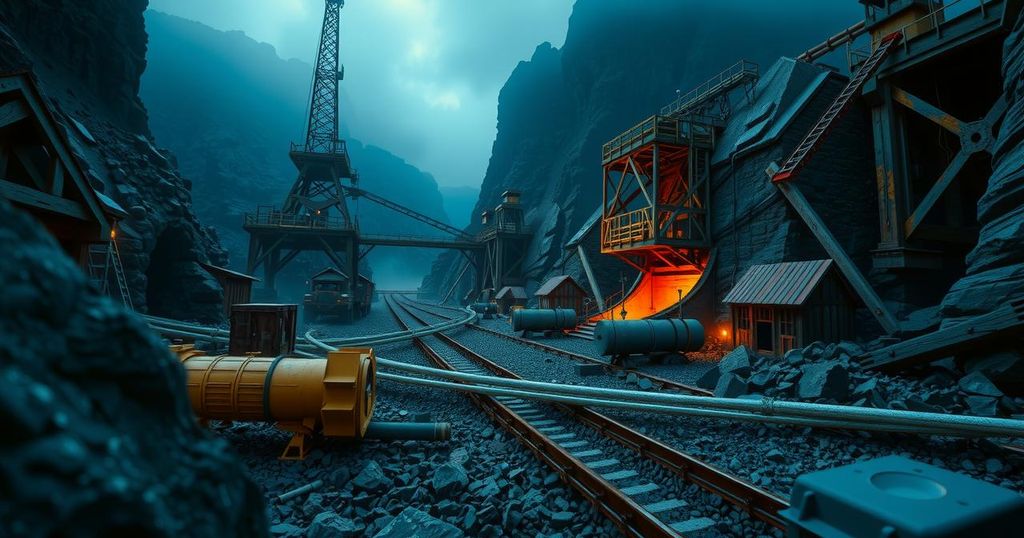The article illuminates Europe’s reliance on cobalt from the Democratic Republic of the Congo (DRC) amidst growing concerns about ethical sourcing and dependency on China for processing. Marie-Pierre Vedrenne emphasizes the need for a unified European strategy, while local stakeholders, such as Simon Tuma Waku, advocate for greater respect of Congolese agency in negotiations. Despite regulatory progress in the DRC, China remains the dominant player in the cobalt supply chain, complicating Europe’s aspirations for sustainable partnerships.
In the heart of Europe, concerns are growing regarding the continent’s reliance on cobalt sourced from the Democratic Republic of the Congo (DRC). Marie-Pierre Vedrenne, a Member of the European Parliament, articulates the necessity for a unified stance among European nations to secure a reliable and sustainable raw material supply. With two-thirds of the world’s cobalt originating from the DRC, it plays a crucial role in Europe’s transition towards environmental sustainability, emphasizing the need for ethical extraction practices that combat exploitation.
Far from the bustling European parliament, miners such as Paul Zagabe Nbanze toil in DRC’s Kolwezi region, often under harsh conditions, extracting valuable cobalt without knowledge of its ultimate use. The stark contrast between DRC’s labor-intensive mining practices and the sophisticated, technology-driven infrastructure of Europe highlights the intricacies of this supply chain. In recent years, cobalt production in the DRC surged from 800 metric tons in 1994 to 98,000 metric tons by 2020, while production elsewhere has lagged behind.
However, despite the DRC’s significant production capacity, Europe faces complications due to China’s dominant role in processing cobalt, controlling 75% of the value-added activities in the supply chain. This dependence raises concerns about exploitative practices in Chinese mining operations in Africa, as noted by Vedrenne, who stresses the need to prioritize local capacity building and ethical business practices. Congolese businessman Simon Tuma Waku urges European nations to engage with African interests, advocating for partnerships that respect local agency.
Historically, the DRC has endured a painful legacy of exploitation, dating back to the colonial era, leading to systemic issues in investment and profit distribution within the mining sector. However, recent regulatory reforms and a push towards collaboration with international stakeholders indicate signs of promise in revitalizing the industry. The European Union’s initiatives, such as the Lobito Corridor project aimed at enhancing trade infrastructure, reflect efforts toward improved cooperation.
Despite European ambitions to become a key player in DRC’s mining sector, China remains the predominant partner. While there are notable projects and policies in place, it will require sustained commitment and genuine partnerships to enhance Europe’s standing and foster a mutually beneficial relationship with the region.
The Democratic Republic of the Congo is a vital source of cobalt, a key component in batteries essential for Europe’s energy transition to neutrality by 2050. The significant increase in cobalt production from the DRC captures the attention of European nations faced with establishing sustainable and ethical supply routes. The role of China in processing DRC’s cobalt highlights international dynamics within the mining industry, presenting challenges and opportunities for collaboration between Europe and Africa.
In summary, Europe’s increasing dependence on Congolese cobalt amidst a backdrop of historical exploitation demands a reevaluation of trade practices and partnerships. While the DRC emerges as a significant player in the global cobalt market, the influence of Chinese processing presents a complex challenge for Europe’s ambitions. Genuine collaboration, with a focus on sustainable practices and respect for local interests, is crucial for building a framework that benefits both regions.
Original Source: www.dw.com






